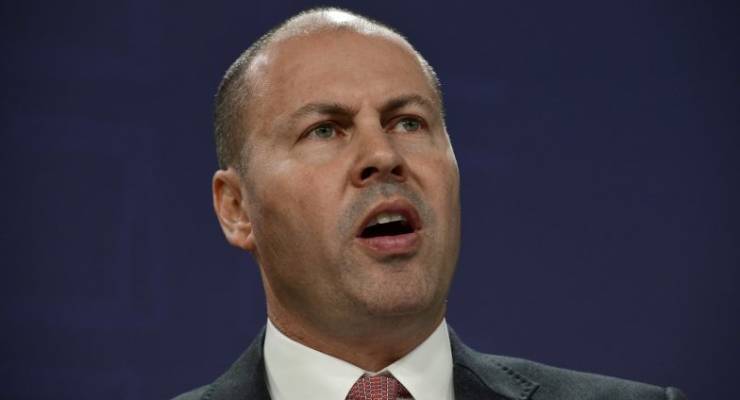
Unusually for a Liberal Treasurer, Josh Frydenberg has found himself target practice for Australia’s business elite, outraged by his call that they should stop handing back cash to shareholders and start investing more. Headlines like “Business leaders angrily push back against Treasurer on investments“, “CEOs and fundies challenge Treasurer on investment” and “Business doesn’t need Frydenberg’s advice on capital management” greeted the Treasurer after he told the Business Council that companies should be more like CSL and Cochlear, rather than paying out dividends and engaging in share buybacks.
Particularly impressive was Boral’s Mike Kane, who thundered “I don’t wait to be told by politicians as to what we’re supposed to do. What we’re doing is what’s in the best interests of Boral and its shareholders in the long run.” As if to illustrate that, Boral was dropping a cool 20% from its share price as he was speaking.
As Crikey noted yesterday, Frydenberg was being disingenuous when he claimed the government was doing all it could to stimulate productivity growth. But at least he was prepared to point out the reality about business investment — and didn’t the business community hate it. Much of the response was about why companies were handing back so much capital to shareholders. It was all Labor’s fault, argued Stephen Bartholomeusz. It was because Australia’s dividend imputation system encouraged companies to focus on dividends, a number of commentators (correctly) observed. Many sectors have low growth and there’s no decent returns to be had, some argued. Companies don’t even have any responsibility to boost the economy, said one fund manager. Investors are better at allocating investment than wasteful, empire-building managers.
The curious thing about all of these arguments as to why business isn’t investing is that, apart from the effort to lay it all at Bill Shorten’s feet, they all applied equally when Australian business, and the Coalition, were arguing that large corporations should be given tens of billions of dollars in tax cuts so that they would invest more. It’s testimony to the “perpetual present” of Australian public affairs — that convenient amnesia that prevents people from remembering what happened more than five minutes ago — that Australian business can now blithely explain all the reasons why, in effect, company tax cuts would not have been directed toward extra investment, despite arguing precisely that for most of the last decade.
What was entirely absent from either Frydenberg’s analysis or the business response was the primary cause of sluggish growth of the kind that makes businesses reluctant to invest: stagnant household incomes due to years of low wages growth. With households providing three-fifths of economic growth, when government and business work to deliberately force down wages, the inevitable result is an economy where business lament the lack of growth opportunities to invest in.
The nearest we got to that issue was the argument that high dividends are a form of economic stimulus. “Higher dividends can get consumers to open their wallets,” wrote one business columnist, noting “many of these dividend-needy shareholders will be older Australians that rely on income from their shares.” FMG’s Elizabeth Gaines, enjoying the revenue boom that came from an extraordinary spike in iron ore prices, said dividends “[help] stimulate the economy … as part of consumer spending in Australia.”
Is this the business community’s economic stimulus plan? A rich seniors-led recovery? Wealthy retirees showering the economy with dividends? What will they do with them — splash out on a new tender for the yacht, perhaps? Or are they more likely to save it, given they’re already doing very nicely from taxpayers, thank you — especially compared to low income workers who spend every cent they earn and who are struggling in the face of penalty rate cuts and wage stagnation?
Frydenberg may be clueless as to solutions but at least he knows there’s a problem. Some in the business community appear oblivious to even that.








How long has it taken him to find this road to Damascus? And how much of it is show?
Fraudberg citing Cochlear???? It was only a couple of weeks ago their CEO was warning that this government (with an inate Coal-ition set against spending on such frivolity :- “Such stuff should be left to overseas overlords, to profit from, when we import it”?) needs to do more to encourage R&D or it will all float away overseas?
Why is this vacuous and contradictory outcry form business surprising. The Hayne RC laid bare how dumb and is malevolent the leadership of Australian business. If the banks and financial institutions are so greedy and lawless, so is all of big business in Australia. And small business engages in wage theft as a way to boost profits. Why then do we take any notice of what business lobbies think? Oh yeah, that’s right, it owns the Liberal Party.
Cochlear P/L has a terrible record as an employer. You don’t want Australian companies aping that particular employer.
“Perpetual Now”, definitely, in the great unwashed electorate, but add the term “Perpetual Hypocrisy” to the business groups and conservative politicians.
Frydenberg needs to go back to school and learn how MMT actually works. It might reveal that sovereign governments can spend as they see fit as long as it does not cause inflation.
Wikipedia isn’t very kind to mmt, but it’s one of the areas of wiki that reads like opinion.